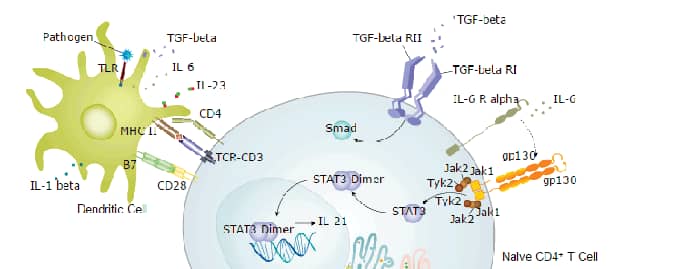Mouse TGF-beta RI/ALK‑5 Biotinylated Antibody Summary
Ala21-Glu121
Accession # BAA05023
Applications
Please Note: Optimal dilutions should be determined by each laboratory for each application. General Protocols are available in the Technical Information section on our website.
Reconstitution Calculator
Preparation and Storage
- 12 months from date of receipt, -20 to -70 °C as supplied.
- 1 month, 2 to 8 °C under sterile conditions after reconstitution.
- 6 months, -20 to -70 °C under sterile conditions after reconstitution.
Background: TGF-beta RI/ALK-5
Most cell types express three sizes of receptors for TGF-beta. These are designated Type I (53 kDa), Type II (70-85 kDa), and Type III (250-350 kDa). The Type III receptor, a proteoglycan that exists in membrane-bound and soluble forms, binds TGF-beta 1, TGF-beta 2, and TGF-beta 3 but does not appear to be involved in signal transduction. The Type II receptor is a membrane-bound serine/threonine kinase that binds TGF-beta 1 and TGF-beta 3 with high affinity and TGF-beta 2 with a much lower affinity. The Type I receptor, originally known as ALK-5 (Activin receptor‑like kinase) is also a membrane-bound serine/threonine kinase that apparently requires the presence of the Type II receptor to bind TGF-beta. Current evidence suggests that signal transduction requires the cytoplasmic domains of both the Type I and Type II receptors.
- Miyazono, K. et al. (1994) Adv. In Immunol. 55:181.
- Massagùe, J. (1998) Ann. Rev. Biochem. 67:753.
Product Datasheets
Citation for Mouse TGF-beta RI/ALK‑5 Biotinylated Antibody
R&D Systems personnel manually curate a database that contains references using R&D Systems products. The data collected includes not only links to publications in PubMed, but also provides information about sample types, species, and experimental conditions.
1 Citation: Showing 1 - 1
-
Fibroblast-specific expression of a kinase-deficient type II transforming growth factor beta (TGFbeta) receptor leads to paradoxical activation of TGFbeta signaling pathways with fibrosis in transgenic mice.
Authors: Denton CP, Zheng B, Evans LA, Shi-wen X, Ong VH, Fisher I, Lazaridis K, Abraham DJ, Black CM, de Crombrugghe B
J. Biol. Chem., 2003-04-21;278(27):25109-19.
Species: Mouse
Sample Types: Whole Cells
Applications: Flow Cytometry
FAQs
No product specific FAQs exist for this product, however you may
View all Antibody FAQsReviews for Mouse TGF-beta RI/ALK‑5 Biotinylated Antibody
There are currently no reviews for this product. Be the first to review Mouse TGF-beta RI/ALK‑5 Biotinylated Antibody and earn rewards!
Have you used Mouse TGF-beta RI/ALK‑5 Biotinylated Antibody?
Submit a review and receive an Amazon gift card.
$25/€18/£15/$25CAN/¥75 Yuan/¥2500 Yen for a review with an image
$10/€7/£6/$10 CAD/¥70 Yuan/¥1110 Yen for a review without an image




